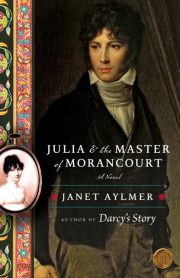However, many businessmen and entrepreneurs, like Harry Douglas in this story, left their old lives behind to become wealthy and prosperous, often married well, and were eventually able to buy social respectability by purchasing a handsome country house. Although some prejudice remained against “self-made men,” it often took only a couple of generations for the modest origins of a gentleman to be forgotten and for his descendants’ owning a rural estate to be fully accepted amongst the landed gentry.
By the early 1800s, many parents had become more willing to take the personal preferences of their children into account when deciding whom they should marry. However, the cachet of a title could still be very persuasive, and Julia Maitland’s mother was not unusual in being prepared to ignore the personal failings of Dominic Brandon because he was the heir to a great estate, so that her eldest daughter could have the certain prospect of becoming a countess if she married him.
But behaviour that might be seen as high spirits in well-born young gentleman was completely unacceptable in their sisters, who were expected to behave with proper decorum if they were to “marry well.” Enlightened parents encouraged their daughters to learn to read and write, either at home or by sending them to school, as well as learning household management and “genteel” pursuits such as drawing, embroidery, or playing the piano. Books, in particular literary novels, became more readily available, whether from a lending library or for sale to those who could afford to buy them.
Well-intentioned family members, such as Julia Maitland’s Aunt Lucy, could offer a valuable service by introducing young ladies to “the season” in London or a spa town. Fashionable places such as Bath and Brighton offered seasonal entertainments to rival those in London, including concerts as well as plays performed in the newly built theatres. There were other pastimes, such as visiting pleasure gardens, open to young people. The first balloon flights took place before the turn of the previous century and, by the early 1800s, were a not uncommon feature in some English towns and cities. More sophisticated carriages were developed, such as the curricle (the “racing car” of the day) and were driven by men of quality in competition with their friends, or to impress the young ladies. But their sisters usually had to be content with the occasional opportunity to take the reins of a curricle, if at all, in the privacy of the family’s estate.
Dances and other social events in places such as Bath were opportunities for young ladies of marriageable age to meet a much larger number of eligible young men than was possible in a rural area with few neighbours and at some distance from a town of any size. Initially, dancing was still a very formal affair, and there was always a chaperone for a young woman in a public ballroom. The introduction of the waltz in 1815, with the couple dancing together in a semi-embrace, was revolutionary because it allowed an intimacy between the sexes that was very different from the existing more formal dances such as the cotillion or the quadrille, which were based on a set of eight or more participants.
Other Aspects of Life in the 1800s
A wider choice of fabrics like silk and fine wines and other luxury goods became available at this time but, during the Napoleonic blockade, could only be obtained by smuggling across the English Channel from France and Spain, with the associated high costs. The transport of goods within the country was being revolutionised by the digging of canals to transport products from mills and factories to the major towns and cities, but personal travel by coach or on horseback was still a slow and uncomfortable business on badly made roads.
The progress of the economy at home could be very uneven. Although many new banks were founded by the gentry and businessmen during the Regency period to invest in land and new technical innovations, a bad harvest or a renewal of the conflict with Napoléon could lead to “a run” on a bank, which could bankrupt its investors, or at best mean that honourable gentleman such as Julia’s father Lewis Maitland saw their incomes severely affected. In that situation, having friends with money or connections, like Harry Douglas or the Earl of Cressborough in my story, could make all the difference until easier times came along.
Another unpredictable aspect of life in the early 1800s was health and survival. Many women, like four of Jane Austen’s own sisters-in-law, died early in childbirth because of the limitations of medical knowledge at the time. Few other health problems were fully understood. A fashionable doctor based in London or one of the spa towns could make a very good living, especially if they obtained a royal patron like Sir William Knighton, but Julia Maitland and her family in my novel had good cause to be fearful about her father’s heart condition. Many events in history would have had a very different outcome if modern medical knowledge had been available.


"Julia and the Master of Morancourt" отзывы
Отзывы читателей о книге "Julia and the Master of Morancourt". Читайте комментарии и мнения людей о произведении.
Понравилась книга? Поделитесь впечатлениями - оставьте Ваш отзыв и расскажите о книге "Julia and the Master of Morancourt" друзьям в соцсетях.